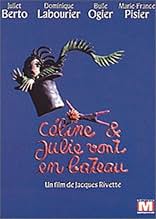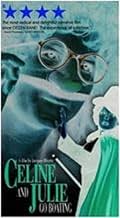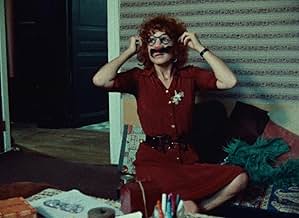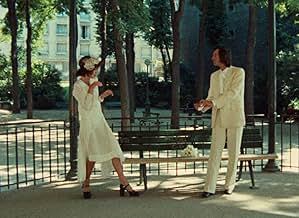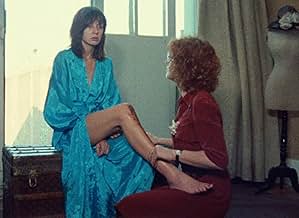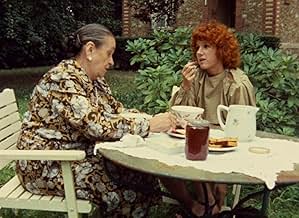Céline et Julie vont en bateau
Original title: Céline et Julie vont en bateau : Phantom Ladies Over Paris
- 1974
- Tous publics
- 3h 13m
IMDb RATING
7.2/10
6.8K
YOUR RATING
A mysteriously linked pair of young women find their daily lives preempted by a strange boudoir melodrama that plays itself out in a hallucinatory parallel reality.A mysteriously linked pair of young women find their daily lives preempted by a strange boudoir melodrama that plays itself out in a hallucinatory parallel reality.A mysteriously linked pair of young women find their daily lives preempted by a strange boudoir melodrama that plays itself out in a hallucinatory parallel reality.
- Awards
- 1 win total
Jean-Claude Biette
- Spectateur au cabaret
- (uncredited)
Jacques Bontemps
- Lecteur à la bibliothèque
- (uncredited)
Michel Caen
- Spectateur au cabaret
- (uncredited)
Featured reviews
Last year, at a crisis time of imminent homelessness, I went to the video store with the idea of renting some banal new release to distract me from my troubles. Waiting in line holding a video starring Tom Hanks (or was it Kevin Costner? Maybe it was Julia Roberts. Such a blur is Hollywood today) something in the foreign section an aisle down caught my eye. It was the video for Jacques Rivette's 1974 masterpiece, Celine and Julie Go Boating.
Immediately upon seeing the cover image of Juliet Berto (Celine) posed as a magician, her Dietrich hauteur kinky and comical, I knew it would be my kind of film. I was also pleased to see it was such a long film it had to be contained in a two-video set. It had long been my suspicion that all secrets of life would be revealed in a film over three hours long and in French.
Indeed, Celine and Julie is just that film. But it conceals as it reveals, which is to say that its great mysteriousness results from its floribundance of revelation. Yes, my friend, a floribundance! I never even thought of such a word until seeing Celine and Julie.
Critics have been unable to explain what it's "about". I cannot. I can't explain the plays of Shakespeare or the poems of Emily Dickinson, but I am moved by them. Attempts to understand them can lead to intense mental spasmodics, but the pain, if the work is good, can be great.
Those who've seen the film will remember the hard magic candy the women savored on their own path to understanding. Vision giving, the candy became an addiction to them. Once is never enough and hasn't been for me. I have seen Celine and Julie three times and thought of it many more.
My favorite scene is where Celine performs her weird magic act in a nightclub where, as far as I can tell, the customers are all convicted poets. The atmosphere there is fascinating. Time stops while she does her act, which is beyond words, indescribable. The whole feeling in that scene of a kind of super sophisticated moment of comedy and sex and mystery all shared by a group of people in silence is one that I find marvelously inspiring. Surely some clever entrepreneur in San Francisco, where I reside, could open such a club. Oh, I suppose it won't happen, but at least one can dream.
Really, it's the importance, power and pleasure-pain of dreaming that this film reawakended me to when I saw it months ago. To be like Celine and Julie with their minds moved by candy is a state I aspire to daily.
When I was briefly without a place to live, I thought of this film and was taken to a sunny day in Montmarte, a house where the living and unliving mingle, a library where stalkers and smokers meet. I savored that magic, the effect of great art on the mind, and I knew I was not truly homeless.
Immediately upon seeing the cover image of Juliet Berto (Celine) posed as a magician, her Dietrich hauteur kinky and comical, I knew it would be my kind of film. I was also pleased to see it was such a long film it had to be contained in a two-video set. It had long been my suspicion that all secrets of life would be revealed in a film over three hours long and in French.
Indeed, Celine and Julie is just that film. But it conceals as it reveals, which is to say that its great mysteriousness results from its floribundance of revelation. Yes, my friend, a floribundance! I never even thought of such a word until seeing Celine and Julie.
Critics have been unable to explain what it's "about". I cannot. I can't explain the plays of Shakespeare or the poems of Emily Dickinson, but I am moved by them. Attempts to understand them can lead to intense mental spasmodics, but the pain, if the work is good, can be great.
Those who've seen the film will remember the hard magic candy the women savored on their own path to understanding. Vision giving, the candy became an addiction to them. Once is never enough and hasn't been for me. I have seen Celine and Julie three times and thought of it many more.
My favorite scene is where Celine performs her weird magic act in a nightclub where, as far as I can tell, the customers are all convicted poets. The atmosphere there is fascinating. Time stops while she does her act, which is beyond words, indescribable. The whole feeling in that scene of a kind of super sophisticated moment of comedy and sex and mystery all shared by a group of people in silence is one that I find marvelously inspiring. Surely some clever entrepreneur in San Francisco, where I reside, could open such a club. Oh, I suppose it won't happen, but at least one can dream.
Really, it's the importance, power and pleasure-pain of dreaming that this film reawakended me to when I saw it months ago. To be like Celine and Julie with their minds moved by candy is a state I aspire to daily.
When I was briefly without a place to live, I thought of this film and was taken to a sunny day in Montmarte, a house where the living and unliving mingle, a library where stalkers and smokers meet. I savored that magic, the effect of great art on the mind, and I knew I was not truly homeless.
I recommend people read "Excruciating" (federovsky, 8/30/12) and "Much Ado About Nothing" (Milan, 4/15/2012) if they want to know what they are in store for. "Celine and Julie Go Boating" is difficult, frustrating and over long. However, it is also the kind of film that after seeing it, you wonder what other people have to say about it.
I didn't enjoy it much. Visually, it is not terribly special. The relationship between the two women and the "haunted house" is what keeps us watching, but the scenes come very slowly.
Several people have said it unfolds like a dream. Others have pointed out the lesbian/feminist side to it. Another possibility is that the two women represent two personalities of a schizophrenic nurse who committed an unspeakable crime. That would explain the repetitive cutting between one woman as the nurse and then her counterpart switching in. The two sides of the same madwoman angle possibly explains why the story includes the woman who is a performance amateur subbing for the experienced magician.
Between "Celine" (Juliet Berto) and "Julie" (Dominique Labourier), I think Labourier is the strongest here. Labourier has a lot of charisma; too bad Rivette has her often just laughing directly into the camera.
The characters in the "haunted house" are interesting. Marie-France Pisier is a favorite of mine, and she is very mysterious here.
If the scenes didn't unfold so sluggishly, and if the narrative were tighter, I think it would have been great. Unfortunately, it is too much work to recommend.
I didn't enjoy it much. Visually, it is not terribly special. The relationship between the two women and the "haunted house" is what keeps us watching, but the scenes come very slowly.
Several people have said it unfolds like a dream. Others have pointed out the lesbian/feminist side to it. Another possibility is that the two women represent two personalities of a schizophrenic nurse who committed an unspeakable crime. That would explain the repetitive cutting between one woman as the nurse and then her counterpart switching in. The two sides of the same madwoman angle possibly explains why the story includes the woman who is a performance amateur subbing for the experienced magician.
Between "Celine" (Juliet Berto) and "Julie" (Dominique Labourier), I think Labourier is the strongest here. Labourier has a lot of charisma; too bad Rivette has her often just laughing directly into the camera.
The characters in the "haunted house" are interesting. Marie-France Pisier is a favorite of mine, and she is very mysterious here.
If the scenes didn't unfold so sluggishly, and if the narrative were tighter, I think it would have been great. Unfortunately, it is too much work to recommend.
10Corwin-3
Movies would seem to be the ideal medium for surrealism, yet there are almost no good surrealist movies. There is the venerable "Un Chien Andalou", and there is "Celine et Julie vont en Bateau", and that might well be the lot. "Celine et Julie" has been one of my favorite films since I first saw it in the 1970s, because it is hypnotic, thought-provoking, mysterious, and funny, all at once. Its overall style could be described as magical realism, in which the quotidian life of Paris serves as a mere background for the magical fantasy life of the protagonists, two young women on a psychic journey, which may or may not end in madness ("vont en bateau", which literally means "go boating", is also slang for "go crazy").
The film is made of moments that seem to happen outside of time. In fact, the passage of time, the succession of events in everyday life, becomes an intrusion on the increasingly shared inner life of the two women, and each takes (hilarious) action to prevent those intrusions from continuing. They determine, in effect, that they must return as adults to their childhood in order to change the past. This may sound like a boring Freudian nightmare, but there is no heavy-handed psychologizing in the movie; it is all play, lighthearted yet beautifully composed. The sound-track is particularly effective, almost hyperrealistic, with no background music. The click of heels on pavement, or the motor of a taxi, loom out of the silence as in a dream, which the movie may be, at its heart.
I give this one a 10. You probably know already whether you would like it. If so, see it in a theater if you can, and on video if you must, but don't miss it.
The film is made of moments that seem to happen outside of time. In fact, the passage of time, the succession of events in everyday life, becomes an intrusion on the increasingly shared inner life of the two women, and each takes (hilarious) action to prevent those intrusions from continuing. They determine, in effect, that they must return as adults to their childhood in order to change the past. This may sound like a boring Freudian nightmare, but there is no heavy-handed psychologizing in the movie; it is all play, lighthearted yet beautifully composed. The sound-track is particularly effective, almost hyperrealistic, with no background music. The click of heels on pavement, or the motor of a taxi, loom out of the silence as in a dream, which the movie may be, at its heart.
I give this one a 10. You probably know already whether you would like it. If so, see it in a theater if you can, and on video if you must, but don't miss it.
Some directors use less than 2% of their footage in the final cut but Rivette must have used 92% of his to make this - perhaps he used absolutely everything, including, apparently, out-takes. Tedium sometimes has a point, but not here. This is annoying-tedium for every scene seems calculated to test our patience. There's no humour or verve or flair or great lines or classic scenes, not even sad attempts at those things, only a forced drollerie that falls flat in every scene There is endless silly giggling, scenes such as those in the nightclub that are just tiresome to watch, fantasy sequences that are presumably meant to look like a corny TV sitcom, but, lacking any scrap of humour, the point is entirely lost and the actors flounder. The girls try far too hard to be cute, and only succeed in being cloying. And I'm waiting for a director to grasp this simple truth: that giving the actors free rein does not make the action more spontaneous and natural, only more strangulated, more self-conscious, more unnatural and cringe-inducing than if they were following a consistent and meticulous script.
After a while you realise Rivette is just playing silly buggers. Fluffed lines are left in, characters glance inadvertently-deliberately at the camera. Rivette will be saying: 'Regard, c'est un film that is pas un film, we're deliberatement toying avec your illusions'. I'm saying: Vous etes un wankeur.
Why three hours? A Senses of Cinema article is eager to explain: 'The tradition of rigid adherence to the 90 minute to 2-hour time frame, enforced by the laws of free market capitalism, is exploded by Rivette. As a filmmaker, Rivette refuses to confine himself to these arbitrary lengths, or to the even more arbitrary, if unspoken, rules about demands on subject matter and mise-en-scène in films of epic length. Instead, Rivette extends the lengths of his films to a point beyond necessity, where it is understood that the film's length in and of itself is a statement about the system he works in and rebels against.' 3 hours simply to defy (capitalistic??) convention? Wankeur.
The audience are the dupes here - poked fun at for trying to apply reality to what is self-consciously only a film. This is not New Wave. I'm gazetting Rivette as a hanger-on, a copyist. He wants to shoot in the style of Rohmer, but he hasn't got Rohmer's indefinable deftness. He wants to break the rules like Godard but he has not got Godard's indefinable style or charisma. He wants to say something meaningful in an offhand way, like Truffaut, but he hasn't got that indefinable intellect for it. All he can do is try. You can feel him trying. It boils down to a single lame joke that isn't funny and a single idea that isn't clever. Three hours of film-flam, tiresome beyond belief.
After a while you realise Rivette is just playing silly buggers. Fluffed lines are left in, characters glance inadvertently-deliberately at the camera. Rivette will be saying: 'Regard, c'est un film that is pas un film, we're deliberatement toying avec your illusions'. I'm saying: Vous etes un wankeur.
Why three hours? A Senses of Cinema article is eager to explain: 'The tradition of rigid adherence to the 90 minute to 2-hour time frame, enforced by the laws of free market capitalism, is exploded by Rivette. As a filmmaker, Rivette refuses to confine himself to these arbitrary lengths, or to the even more arbitrary, if unspoken, rules about demands on subject matter and mise-en-scène in films of epic length. Instead, Rivette extends the lengths of his films to a point beyond necessity, where it is understood that the film's length in and of itself is a statement about the system he works in and rebels against.' 3 hours simply to defy (capitalistic??) convention? Wankeur.
The audience are the dupes here - poked fun at for trying to apply reality to what is self-consciously only a film. This is not New Wave. I'm gazetting Rivette as a hanger-on, a copyist. He wants to shoot in the style of Rohmer, but he hasn't got Rohmer's indefinable deftness. He wants to break the rules like Godard but he has not got Godard's indefinable style or charisma. He wants to say something meaningful in an offhand way, like Truffaut, but he hasn't got that indefinable intellect for it. All he can do is try. You can feel him trying. It boils down to a single lame joke that isn't funny and a single idea that isn't clever. Three hours of film-flam, tiresome beyond belief.
10ella-48
As a teenager in the 1970s, I was a frequent visitor to an art gallery in Liverpool called the Open Eye. When they started a film club, promising to show all the stuff I had read about but would never otherwise get a chance to see, I signed up like a flash.
It was a humble affair: a bare room with temporary blackouts on the windows, a makeshift screen at one end, a projector at t'other and a dozen or so ill-assorted chairs inbetween, but I loved it. For me it was a magic grotto: a portal to another place of endless fascination and discovery. It was here that I had my first exposure to the works of Buñuel, Renoir, Fritz Lang; Dziga Vertov's "Man With a Movie Camera"; the experimental shadowgraph animations of Man Ray; David Lynch's Eraserhead and, unforgettably, "Céline et Julie vont en bateau".
Even for one as keen on "Art" cinema as I was, Céline et Julie was a bit of a challenging prospect: a low-budget French thing about god-knows-what, by a director I'd never heard of, that we were warned would run over three hours without interval. Little did I know, as the opening credits rolled, that from then on time would mean nothing and I would be held captive; enthralled; the hours slipping by unheeded, as when dreaming.
It is this quality that, for me, makes this film so special. European (especially French) cinema is full of works that lay claim to the label "Surrealist". I have to say that in my opinion most of them have little to do with the truly surreal at all. More often than not they are simply a cocktail of absurdism and social satire.
Céline et Julie, on the other hand, is a genuinely surreal film possibly the ONLY genuinely surreal film ever made (!) - insomuch that its narrative (and hence the experience of watching it unfold) is uncannily dreamlike. From the outset the viewer is drawn inexorably forward by a teasing sense of curiosity. Frequently along the way there seems to be far too much going on that is unexplained, and little hope of fitting it all together, yet one cannot help but remain in the story. In time, we become aware that our mixed sensations as viewer are mirroring those being experienced by Céline and Julie and thus we find ourselves in that familiar condition of the dreamer: of being simultaneously both onlooker and protagonist in our own drama.
Afterwards, I was left feeling curiously elated, yet struggling to recall its details with any precision. The impressions it had left behind were powerful and thought-provoking, yet intangible, and recalled but imperfectly, in the manner of one who has just awoken: with a frustrating uncertainty as to exactly what had occurred, to whom and in what order. Any attempt to explain it to a third party was equally doomed. Just as with a half-remembered dream, the very act of telling caused the peculiar para-logic of the narrative to disintegrate, and I'd be left speechless.
It's been part of me ever since. Over the last 30-odd years, the themes and images of this film have, in the nicest possible way, haunted me: lurking in the shadows of consciousness, beyond the clumsy reach of rational query, quietly informing my imagination, to appear, unbidden, in subtle and unexpected ways in my own creative output.
The whole strange business has been made all the more uncanny by the fact that, throughout those 30-odd years, the film itself has been lost to me. Having experienced it the once, I was never able to find Céline et Julie again, nor any reference to it, even in the pages of famously trusted and supposedly 'comprehensive' movie guides. Likewise, whenever I mentioned the film in conversation I could never come across anyone who had ever heard of it. Having worked its mischief, the contrary creature had melted back into the half-light, leaving no trace of its existence.
Then, in October of 2006, a miracle: there it was, right in front of me, listed in the TV schedules! Film4 was showing it at the suitably unconscious hour of 3am. Unwilling to risk losing it for another 30 years to the vagaries of my video recorder's dodgy timer, I sat up, my finger hovering nervously over the Record button...
A few days later, having found an afternoon in which we were free of commitments, my partner and I settled in to watch it: she with some scepticism that she would be able to maintain her interest for the whole 3 hours, and me both a-quiver with anticipation and privately praying that, in the hard light of reality, this thing of treasured half-memory would not prove itself to be The Worst Load Of Pretentious Tripe Ever Made.
I needn't have worried. No sooner had I hit "Play" than that fragrant, familiar magic began weaving itself all over again. I am delighted to report that Céline et Julie is just as powerful an experience now as it was in my youth.
What I had forgotten, or perhaps never noticed at all on first viewing, was just what a rough-edged, homespun creature it is in technical terms. It was shot entirely on location, on 16mm and with a very small crew, and it shows. The soundtrack is patchy in places and frequently prey to whatever ambient sounds were present when the camera rolled (usually Parisian traffic noise). Now and then the acting is self-conscious, and some of the reaction shots are clumsily done. In the end, though, none of this matters a damn. Indeed, it is the film's very lack of studio polish that gives it much of its special flavour. Céline et Julie is an imperfect creation, but an honest one. It is also charming, playful and frequently hilarious. As such, I recommend it unreservedly.
It was a humble affair: a bare room with temporary blackouts on the windows, a makeshift screen at one end, a projector at t'other and a dozen or so ill-assorted chairs inbetween, but I loved it. For me it was a magic grotto: a portal to another place of endless fascination and discovery. It was here that I had my first exposure to the works of Buñuel, Renoir, Fritz Lang; Dziga Vertov's "Man With a Movie Camera"; the experimental shadowgraph animations of Man Ray; David Lynch's Eraserhead and, unforgettably, "Céline et Julie vont en bateau".
Even for one as keen on "Art" cinema as I was, Céline et Julie was a bit of a challenging prospect: a low-budget French thing about god-knows-what, by a director I'd never heard of, that we were warned would run over three hours without interval. Little did I know, as the opening credits rolled, that from then on time would mean nothing and I would be held captive; enthralled; the hours slipping by unheeded, as when dreaming.
It is this quality that, for me, makes this film so special. European (especially French) cinema is full of works that lay claim to the label "Surrealist". I have to say that in my opinion most of them have little to do with the truly surreal at all. More often than not they are simply a cocktail of absurdism and social satire.
Céline et Julie, on the other hand, is a genuinely surreal film possibly the ONLY genuinely surreal film ever made (!) - insomuch that its narrative (and hence the experience of watching it unfold) is uncannily dreamlike. From the outset the viewer is drawn inexorably forward by a teasing sense of curiosity. Frequently along the way there seems to be far too much going on that is unexplained, and little hope of fitting it all together, yet one cannot help but remain in the story. In time, we become aware that our mixed sensations as viewer are mirroring those being experienced by Céline and Julie and thus we find ourselves in that familiar condition of the dreamer: of being simultaneously both onlooker and protagonist in our own drama.
Afterwards, I was left feeling curiously elated, yet struggling to recall its details with any precision. The impressions it had left behind were powerful and thought-provoking, yet intangible, and recalled but imperfectly, in the manner of one who has just awoken: with a frustrating uncertainty as to exactly what had occurred, to whom and in what order. Any attempt to explain it to a third party was equally doomed. Just as with a half-remembered dream, the very act of telling caused the peculiar para-logic of the narrative to disintegrate, and I'd be left speechless.
It's been part of me ever since. Over the last 30-odd years, the themes and images of this film have, in the nicest possible way, haunted me: lurking in the shadows of consciousness, beyond the clumsy reach of rational query, quietly informing my imagination, to appear, unbidden, in subtle and unexpected ways in my own creative output.
The whole strange business has been made all the more uncanny by the fact that, throughout those 30-odd years, the film itself has been lost to me. Having experienced it the once, I was never able to find Céline et Julie again, nor any reference to it, even in the pages of famously trusted and supposedly 'comprehensive' movie guides. Likewise, whenever I mentioned the film in conversation I could never come across anyone who had ever heard of it. Having worked its mischief, the contrary creature had melted back into the half-light, leaving no trace of its existence.
Then, in October of 2006, a miracle: there it was, right in front of me, listed in the TV schedules! Film4 was showing it at the suitably unconscious hour of 3am. Unwilling to risk losing it for another 30 years to the vagaries of my video recorder's dodgy timer, I sat up, my finger hovering nervously over the Record button...
A few days later, having found an afternoon in which we were free of commitments, my partner and I settled in to watch it: she with some scepticism that she would be able to maintain her interest for the whole 3 hours, and me both a-quiver with anticipation and privately praying that, in the hard light of reality, this thing of treasured half-memory would not prove itself to be The Worst Load Of Pretentious Tripe Ever Made.
I needn't have worried. No sooner had I hit "Play" than that fragrant, familiar magic began weaving itself all over again. I am delighted to report that Céline et Julie is just as powerful an experience now as it was in my youth.
What I had forgotten, or perhaps never noticed at all on first viewing, was just what a rough-edged, homespun creature it is in technical terms. It was shot entirely on location, on 16mm and with a very small crew, and it shows. The soundtrack is patchy in places and frequently prey to whatever ambient sounds were present when the camera rolled (usually Parisian traffic noise). Now and then the acting is self-conscious, and some of the reaction shots are clumsily done. In the end, though, none of this matters a damn. Indeed, it is the film's very lack of studio polish that gives it much of its special flavour. Céline et Julie is an imperfect creation, but an honest one. It is also charming, playful and frequently hilarious. As such, I recommend it unreservedly.
Did you know
- TriviaIt is a misconception that most of the film was improvised by the actors. Jacques Rivette provided structure but did not let his actors "go wild", instead he let them write. A single scene was improvised, where Celine, played by Julie Berto, brags to her associates about her rich American friend. The rest of the scenes where shot from scripted material, mostly thanks to participating actors. The film is collaboration by several authors, including actors Berto, Labourier, Ogier and Pisier. Rivette's involvement in the writing was to give structure to all the contributions, tightening things up.
- GoofsThe last time Julie receives the cigarette from under the table, it is bigger than it was when her colleague handed it to her.
- ConnectionsFeatured in Berlin Chamissoplatz (1980)
- How long is Celine and Julie Go Boating?Powered by Alexa
Details
Box office
- Gross US & Canada
- $31,452
- Opening weekend US & Canada
- $5,624
- May 6, 2012
- Gross worldwide
- $31,452
- Runtime3 hours 13 minutes
- Sound mix
- Aspect ratio
- 1.37 : 1
Contribute to this page
Suggest an edit or add missing content


